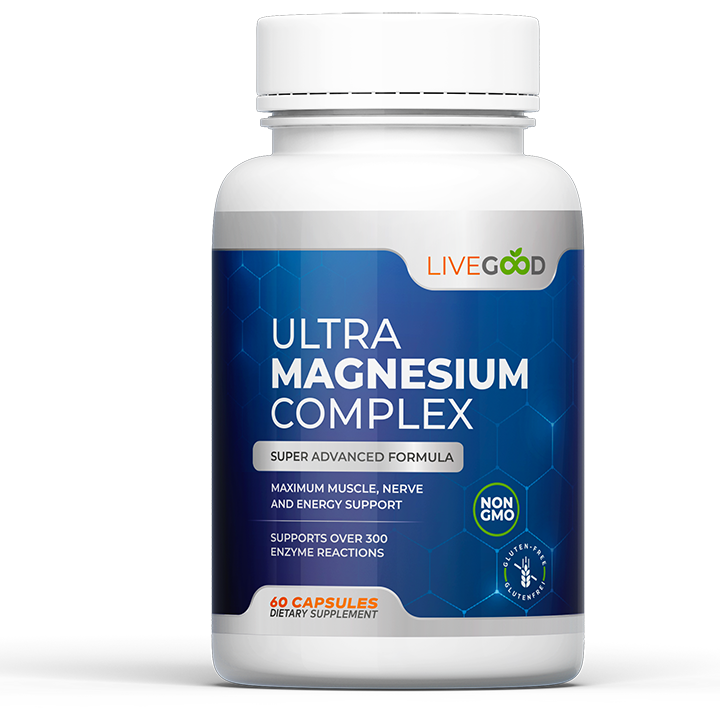Article-at-a-Glance
Magnesium is a natural mineral that can significantly enhance sleep quality.
Magnesium Glycinate and Magnesium Gluconate are among the most bioavailable forms of magnesium.
A typical dose of magnesium for sleep is between 100 to 350 milligrams daily.
Magnesium offers additional health benefits, including anxiety reduction and constipation relief.
It’s important to consult with a healthcare provider before starting any new supplement regimen.
The Secrets of Magnesium for Restful Sleep
When the night falls, and your mind is racing, sleep can feel like a distant dream. But what if I told you there’s a natural way to coax your body into a state of restful slumber? Enter magnesium, a mineral that’s been a game-changer for many looking to improve their sleep naturally. And I’m here to guide you through understanding why magnesium might just be the sleep aid you’ve been searching for.
Most importantly, magnesium is a powerhouse when it comes to promoting relaxation. It’s involved in over 300 biochemical reactions in your body, many of which contribute to muscle relaxation and nervous system calm. Because of this, a magnesium boost before bed can help quieten your body and mind, preparing you for a night of deep sleep.

“Magnesium”- The master mineral …” from healthvision.in
Magnesium aids sleep by activating the parasympathetic nervous system, the system responsible for getting you calm and relaxed. It also regulates neurotransmitters, which send signals throughout the nervous system, and melatonin, the hormone that guides your sleep-wake cycles. Furthermore, magnesium binds to gamma-aminobutyric acid (GABA) receptors. GABA is the neurotransmitter responsible for quieting down nerve activity, which is why magnesium’s role in helping you wind down is so critical.
Now, it’s not just about getting more sleep, but getting better quality sleep. Magnesium can improve the quality of your sleep by increasing the amount of time you spend in restorative slow-wave sleep. This phase of sleep is crucial for feeling refreshed and alert the next day.
Picking the Best Form of Magnesium for Your Sleep Needs
Choosing the right form of magnesium is key, as not all types are created equal when it comes to aiding sleep. You’ll want to opt for forms that are more easily absorbed by your body, so you can get the maximum benefit.
Magnesium Glycinate: Gentle on the Stomach, Tough on Insomnia
Magnesium glycinate is a form of magnesium that’s bound to glycine, an amino acid that itself has calming properties. This form is highly bioavailable, which means your body can use it efficiently. It’s also gentle on the stomach, making it a great option if other forms of magnesium have caused you digestive upset in the past.
Here’s why magnesium glycinate stands out:
It’s one of the best-absorbed forms of magnesium.
The glycine content may further enhance sleep quality.
It’s less likely to cause laxative effects compared to other forms of magnesium.
Magnesium glycinate is often recommended for those who have tried other forms of magnesium without success or have sensitive stomachs. Its effectiveness and gentle nature make it a go-to for improving sleep.
Top Shelf Choices: The Best Magnesium Supplements for Slumber
There are different forms of magnesium and their benefits are describe in more detail below, so let’s explore some of the best magnesium supplements that could help you find the restful sleep you’re after.
Editor’s Pick: Most Potent Sleep Promoting Magnesium Supplement
| Feature | LiveGood Magnesium Complex | Nature’s Bounty Magnesium | Now Magnesium Caps |
|---|---|---|---|
| Price | $8.95 | $6.49 (approx.) | $18.95 (approx) |
| Dosage | 2 capsules daily | 1 tablet daily | 1 capsule daily |
| Magnesium Forms | Magnesium Glycinate, Magnesium Gluconate | Magnesium Oxide | Magnesium Oxide, Magnesium Citrate, Magnesium Aspartate |
| Magnesium Content | Not specified in search results | 500 mg (119% DV) | 400 mg (95% DV) |
| Key Benefits | Anxiety relief, bone strength, heart health, exercise performance | General magnesium supplementation | Optimized absorption with three types of magnesium |
| Additional Ingredients | Chicory Root Inulin | Vegetable cellulose, dicalcium phosphate, calcium carbonate, citric acid, MCTs, polydextrose, vegetable magnesium stearate | Hypromellose, rice flour, silicon dioxide, stearic acid |
| Dietary Considerations | Vegan, Non-GMO | No artificial colors/flavors, Gluten-free, Sugar-free | Vegan, Non-GMO, Free from common allergens |
| Bioavailability | High (claims most bioavailable forms) | Lower (Magnesium Oxide is less bioavailable) | Mixed (includes both high and lower bioavailable forms) |
| Capsule/Tablet Count | 60 tablets | 100 tablets | 180 tablets |
For those seeking a potent sleep aid, LiveGood Ultra Magnesium Complex is a standout. Although on the face of it Nature’s Bounty Magnesium and Now Magnesium Capsules appear more affordable, consider the higher bioavailability of magnesium gluconate and magesium glyconate in the LiveGood brand.
LiveGood Ultra Magnesium Complex is praised for its high quality and the users’ reviews tell their own story. Click here. With a substantial dose of magnesium in a highly absorbable form, it’s a top pick for those serious about improving their sleep.
For more information on LiveGood Ultra Magnesium Complex click here.

Vegan-Friendly Finds: Plant-Based Magnesium Options for a Peaceful Night
For the plant-conscious consumer, LiveGood Magnesium Complex (learn more here) is an excellent choice. Its cruelty-free, environmentally friendly, and specifically designed to meet the needs of those following a vegan lifestyle. Plus, its form of magnesium glycinate means it’s easy on the stomach and great for sleep.

Benefits of Different Forms of Magnesium
Benefits of Magnesium Gluconate
- High bioavailability: Magnesium gluconate demonstrates the highest oral bioavailability among magnesium salts, making it an effective form for supplementation[1].
- Better absorption: It appears to be better absorbed compared to other magnesium forms and causes less diarrhea[1].
- Essential physiological functions: Magnesium gluconate supports healthy physiologic cell function of nerves, muscles, bones, and the heart.
- Mineral supplementation: It is used to prevent and treat low levels of magnesium in the blood[2].
- Enzymatic reactions: Magnesium is essential for many enzymatic reactions in the body, serving as a cofactor in protein synthesis and carbohydrate metabolism[1].
- Cellular functions: It helps maintain low resting intracellular free calcium ion concentration, which is essential for various cellular functions[1].
- Membrane properties: Magnesium affects the electrical properties of membranes and their permeability characteristics[1].
- Bone development: It contributes to the structural development of bone[1].
- DNA and RNA synthesis: Magnesium is essential in the synthesis of DNA, RNA, and the antioxidant glutathione[1].
- Nerve and muscle function: It plays an important role in preserving nerve and muscle cell electrical potentials[1].
- Heart health: Magnesium is important for maintaining normal heart rhythm[1].
These benefits make magnesium gluconate an important mineral supplement for maintaining overall health and addressing specific deficiencies or conditions related to magnesium levels in the body.
Citations:
[1] https://go.drugbank.com/drugs/DB13749
[2] https://www.webmd.com/drugs/2/drug-7946/magnesium-gluconate-oral/details
[3] https://www.webmd.com/vitamins/ai/ingredientmono-998/magnesium
Benefits of Magnesium Glyconate
- Better absorption and bioavailability compared to other forms of magnesium[1][2]
- Reduced risk of digestive side effects like diarrhea compared to other magnesium supplements[1][2]
- May help improve sleep quality and reduce insomnia[1][2]
- Can help reduce anxiety and stress[1][2][4]
- Supports heart health by regulating heart rhythm and blood pressure[1][4]
- May help reduce the frequency and intensity of migraines[1]
- Supports bone health and may help prevent osteoporosis[1][2]
- Helps regulate blood sugar levels and may reduce risk of type 2 diabetes[1][3]
- Supports muscle relaxation and may help with muscle cramps[2]
- May help alleviate PMS symptoms[2]
- Supports overall nervous system health[1][4]
- Plays a role in energy production in the body[4]
- Helps in the production of DNA, RNA, and proteins[4]
- May help improve mood and reduce symptoms of depression[1][3]
It’s important to note that while magnesium glycinate offers these potential benefits, more research is needed to fully confirm some of these effects. Additionally, it’s always best to consult with a healthcare professional before starting any new supplement regimen.
Citations:
[1] https://www.medicinenet.com/benefits_of_taking_magnesium_glycinate/article.htm
[2] https://myacare.com/blog/magnesium-glycinate-benefits-side-effects-social-media-hype-and-more
[3] https://www.medicalnewstoday.com/articles/315372
[4] https://mcpress.mayoclinic.org/nutrition-fitness/magnesium-glycinate-is-this-supplement-helpful-for-you/
Magnesium Citrate: Budget-Friendly and Widely Available
Magnesium citrate is another form that is well-absorbed by the body. It’s also more cost-effective, which makes it a popular choice for those on a budget. While it’s often used to relieve constipation, it can also be helpful for sleep, particularly if you’re dealing with occasional restlessness.
Magnesium Oxide: The Heavy Hitter of Constipation Relief
While magnesium oxide is less frequently recommended for sleep, it’s worth mentioning for its effectiveness in relieving constipation—a common culprit behind restless nights. This form of magnesium acts as an osmotic laxative, drawing water into the intestines and making bowel movements easier. If constipation is part of why you’re tossing and turning, magnesium oxide might just help you clear up digestive discomfort and pave the way for better sleep.
So, there you have it – a breakdown of the best magnesium forms to help you drift off into dreamland. Remember, while magnesium is a fantastic natural remedy for sleep, it’s essential to talk to your healthcare provider before starting any new supplement, especially if you have existing health conditions or are on medication. They can help you determine the right dosage and ensure it’s safe for you to use alongside your current health plan.
Maximizing Magnesium’s Benefits: Tips for Optimal Absorption
To get the most out of your magnesium supplement, it’s crucial to optimize absorption. Here are a few tips:
Take magnesium with a meal to reduce the risk of stomach upset and enhance absorption.
Pair magnesium with foods high in vitamin D and calcium to support bone health.
Avoid taking magnesium at the same time as zinc supplements, as they can compete for absorption.
By following these simple guidelines, you can ensure that your body is getting the full spectrum of benefits from your magnesium supplement.
The Best Time to Take Magnesium for Sleep
The best time to take magnesium for sleep is about 30 to 60 minutes before bed. This timing allows the mineral to start working on calming your nervous system, preparing you for sleep. If you’re using magnesium to help with constipation, consider taking it in the morning instead, when it can help regulate your bowel movements throughout the day.
Complementing Magnesium with Sleep Hygiene Practices
Besides supplementing with magnesium, practicing good sleep hygiene is crucial for enhancing the quality of your rest. Here are some tips to create an ideal sleep environment:
Keep a consistent sleep schedule, even on weekends.
Create a bedtime ritual to signal to your body that it’s time to wind down.
Make your bedroom a sanctuary for sleep: cool, dark, and quiet.
Limit exposure to screens at least an hour before bed to reduce blue light interference with melatonin production.
Engage in regular physical activity during the day to promote better sleep at night.
By combining the calming effects of magnesium with these sleep hygiene practices, you’ll be setting the stage for a night of deep, restorative sleep.
Complementing your magnesium intake with proper sleep hygiene can create a powerful synergy for better sleep. It’s like pairing the right wine with a meal—it enhances the experience. Here are a few habits you can adopt to ensure that your journey to the land of Nod is smooth and swift:
Stick to a consistent sleep schedule, going to bed and waking up at the same times every day.
Develop a pre-sleep routine that may include reading, meditation, or a warm bath.
Ensure your bedroom is conducive to sleep—cool, dark, and quiet.
Avoid caffeine, alcohol and heavy meals close to bedtime.
Limit screen time before bed to minimize exposure to blue light, which can disrupt your circadian rhythm.
By integrating these practices with your magnesium supplements, you’re setting yourself up for success. Think of it as laying a smooth path for magnesium to do its magic.

Now, let’s tackle some of the most common questions you might have about magnesium and sleep.
FAQ
What’s the Daily Recommended Dose of Magnesium for Better Sleep?
The daily recommended dose of magnesium for better sleep is generally between 100 to 350 milligrams. However, it’s essential to consult with a healthcare provider to determine the appropriate dosage for your individual needs. They can take into account factors such as your diet, lifestyle, and overall health to recommend the optimal amount for you.
Other Benefits of Magnesium
Magnesium doesn’t just help with sleep; it’s a holistic health champion. Besides its sleep-inducing properties, magnesium plays a crucial role in maintaining overall health. It’s involved in DNA repair, muscle function, and energy production. It also contributes to the structural development of bone, making it a critical mineral for long-term bone health.
Calming Your Nerves, Soothing Your Sleep
One of magnesium’s superpowers is its ability to calm the nervous system, which is why it’s so effective for sleep. But this calming effect extends beyond the night. During the day, it can help manage stress and reduce anxiety, contributing to a more serene state of mind that sets the stage for better sleep when nighttime rolls around.
Consider this too: a study published in the Journal of Research in Medical Sciences found that magnesium supplementation could significantly improve insomnia among the elderly. It shows that magnesium’s calming effect on the nervous system might be just what you need to break the cycle of sleepless nights.
This connection between daytime calm and nighttime rest cannot be overstated. By managing stress and anxiety during the day with magnesium, you’re laying the groundwork for restorative sleep at night.
Magnesium Can Help Bone Health While You Rest
As you settle into bed, magnesium is hard at work supporting more than just your sleep. It’s essential for bone health, working in tandem with calcium and vitamin D to ensure your bones stay strong and resilient. This is particularly important as we age, when our bones become more susceptible to fractures and osteoporosis.
Can Too Much Magnesium Cause Harm?
While magnesium is generally safe when taken as directed, consuming too much can lead to adverse effects such as diarrhea, nausea, and abdominal cramping. In extreme cases, very high doses can cause magnesium toxicity, which is why sticking to the recommended dosage is crucial. Always start with the lowest possible dose and adjust as needed under the guidance of a healthcare professional. For more information on the effects of sleep deprivation and recovery strategies, visit our detailed guide.
How Long Does It Take for Magnesium to Improve Sleep?
Improvements in sleep can be seen as quickly as within a few days to a week of consistent magnesium supplementation. However, the full benefits may take longer to manifest, and the timeline can vary from person to person. Consistency is key, so give your body time to adjust and respond to the supplement.
Is Magnesium Safe for Everyone?
Magnesium is safe for most people, but there are exceptions. If you have kidney issues or take certain medications, such as diuretics or antibiotics, you MUST talk to your doctor before taking magnesium. Pregnant or breastfeeding women MUST also consult their healthcare provider to determine a safe dosage.
Can I Take Magnesium with Other Sleep Supplements?
Yes, magnesium can be taken with other sleep supplements, such as the melatonin sleep patches, but it’s important to do so under the guidance of a healthcare provider. They can help you understand how different supplements interact and what combination might work best for your unique sleep needs.






Leave a Reply